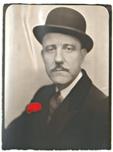MHS News
Atlantic Harvest
Ellery Sedgwick and The Atlantic Monthly, 1909-1938
Atlantic Harvest, the title of Ellery Sedgwick’s 1947 memoir and compilation of favorite articles from The Atlantic Monthly during the years that he was editor (1909-1938), will be the theme of the Society’s exhibition of Ellery Sedgwick papers that opens on 30 October and continues through 30 January 2010. The exhibition draws upon Sedgwick’s voluminous personal and editorial correspondence with an extraordinary range of literary and political figures during those years, together with correspondence and photographs from his personal papers and other collections of Sedgwick family papers held by the Society.
Through his personal correspondence with authors, many of whom he numbered among his friends, the exhibition shows how Sedgwick revived and expanded the Atlantic, increasing its circulation by ten-fold and adding political and economic essays and more contemporary poetry and fiction to its strong literary tradition. The exhibition includes a sampling of Sedgwick’s correspondence with writers and political and social activists including Jane Addams, Willa Cather, Winston Churchill, Robert Frost, James Hilton, William Dean Howells, Sinclair Lewis, Reinhold Niebuhr, Bertrand Russell, Edith Wharton, and Virginia Woolf. The exhibition also documents some of the events and controversies that roiled the pages of the Atlantic. Under Sedgwick’s editorship, the Atlantic published essays on the qualifications of a Roman Catholic—Alfred E. Smith—to be president, Felix Frankfurter’s dissection of the Sacco and Vanzetti case, and Sedgwick’s controversial support for Franco during the Spanish Civil War.
Atlantic Harvest also illustrates how Sedgwick nurtured authors: he brought to prominence (and introduced to each other) Charles Nordhoff and James Norman Hall, who flew for France during the First World War and both independently contributed articles from the Front to the Atlantic, before winning fame together as the authors of Mutiny on the Bounty. Sedgwick sometimes appears to have been a man who never heard a story too good to be true, and the exhibition also includes materials about two famous hoaxes that embroiled his years at the helm of the Atlantic: Wilma Frances Minor’s forgery of the purported love letters of Abraham Lincoln and Ann Rutledge, and the even more fabulous, The Story of Opal (originally serialized in the Atlantic), Opal Whiteley’s account of the diary she supposedly had written as a child.
Atlantic Harvest: Ellery Sedgwick and The Atlantic Monthly, 1909-1938 is supported by the family of Mrs. Ellery Sedgwick, Jr. The exhibition is free and open to the public Monday through Saturday, 1:00 to 4:00 PM, from 30 October 2009 to 30 January 2010.
